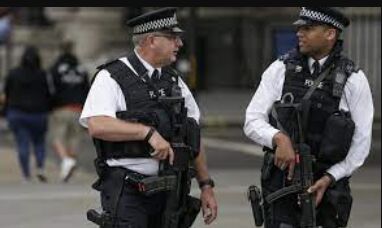London Police Crisis: Officers Refuse Armed Patrols Amid Murder Charge & Racism Allegations
London's police force is in crisis as officers refuse armed patrols following murder charges against a fellow officer in the shooting of an unarmed black man. This has sparked allegations of institutional racism and led to over 100 officers turning in their firearm permits. The situation has prompted an emergency review of armed policing, raising concerns about the unity within the force. The outcome of the review will determine the future of armed policing in London.
London's police force is facing a crisis as some officers refuse to conduct armed patrols following the murder charge against a fellow officer in the fatal shooting of an unarmed Black man. The Metropolitan Police marksman was charged over the September 2022 death of Chris Kaba, who was killed after officers pursued and stopped the car he was driving. The officer allegedly fired a single bullet through the windshield, striking Kaba as he sat in the vehicle.
The case has reignited allegations of institutional racism within the London police department. This has led to several officers stepping back from armed duties, with over 100 officers reportedly turning in their firearm permits. The BBC also reported that police from neighboring forces were called in to help patrol London on Saturday night. The concern among officers stems from the fear that the murder charge signifies a shift in the way their decisions in challenging circumstances will be judged. Home Secretary Suella Braverman, who is responsible for policing in the UK, has pledged to review armed policing to ensure that officers have the confidence to perform their duties.
Braverman believes that armed officers must be able to make split-second decisions under extraordinary pressures without fearing legal consequences. Fatal shootings by police in the UK are rare, with armed officers firing weapons at people only four times in the year leading up to March 2022, according to official statistics. It is also highly uncommon for British police officers to be charged with murder or manslaughter for actions performed while on duty. One of the few cases in recent years involved a police constable convicted of manslaughter for the killing of former professional soccer player Dalian Atkinson.
The scale and speed of this protest by Metropolitan Police armed officers have forced the department to seek assistance from neighboring forces and even call on the SAS for counter-terrorism support. The rebellion among officers has prompted the home secretary to order an emergency review of armed policing. The deployment of SAS soldiers would be reserved for counter-terrorism situations, with police counter-terrorism firearms officers refusing to be available for regular armed duties. However, Braverman's intervention has been met with criticism from opposition politicians, legal figures, and civil rights campaigners.
Labour's Harriet Harman warned against interfering with the criminal justice system, emphasizing the importance of fair trials. The executive director of Inquest, Deborah Coles, argued that suggestions of bias against serving police officers in the legal process were unfounded, as police firearms officers must remain accountable to the rule of law. Met Commissioner Sir Mark Rowley has called for reforms in the rules around police use of force, including a review of how the Independent Office for Police Conduct investigates officers and how the Crown Prosecution Service considers criminal charges against them.
Rowley believes that the system is too slow and often convicts bad officers while accusing good officers, creating years of uncertainty. The disaffection among armed officers has raised concerns about the unity within the police force. Although many have expressed the need for reflection on whether they want to continue carrying a gun, spreading disaffection is considered an offense punishable by imprisonment or fines under the Police Act of 1996.
As the situation unfolds, it is evident that London's police force is grappling with deep-rooted issues of racial bias, accountability, and the challenges faced by officers in making split-second decisions. The outcome of the review ordered by Home Secretary Braverman will be crucial in determining the future of armed policing in the city and ensuring that officers are able to carry out their duties with confidence while protecting public safety.




